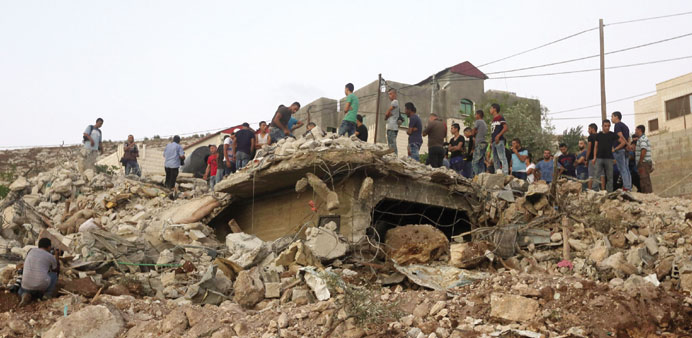Palestinians stand on the rubble of a house which was demolished by Israeli security forces during an overnight raid in Jenin yesterday.
AFP/Geneva
The Gaza Strip, ravaged by wars and nearly a decade of a gruelling Israeli blockade, could become uninhabitable for residents within just five years, the United Nations development agency said yesterday.
“The social, health and security-related ramifications of the high population density and overcrowding are among the factors that may render Gaza unliveable by 2020,” the UN Conference on Trade and Development (Unctad) wrote in its annual report.
Gaza, a tiny enclave of just 362sq km squeezed between Israel, Egypt and the Mediterranean Sea that is home to some 1.8mn Palestinians, counts one of the highest population densities in the world.
“Gaza could become uninhabitable by 2020 if current economic trends persist,” the report said.
While the high density is not new, the situation has been exacerbated by three Israeli military operations in the past six years and nearly a decade-long economic blockade.
The blockade had “ravaged the already debilitated infrastructure of Gaza, shattered its productive base, left no time for meaningful reconstruction or economic recovery and impoverished the Palestinian population in Gaza”, the report said.
“Short of ending the blockade, donor aid... will not reverse the ongoing de-development and impoverishment in Gaza,” it said.
Socio-economic conditions in Gaza today are currently “at their lowest point since 1967”, when Israel seized the territory from Egypt in its Six-Day War, according to the report.
The report estimated that the three military operations, including last year’s devastating war that killed some 2,200 Palestinians and displaced half a million more, had caused economic losses close to three times the size of Gaza’s local gross domestic product.
The 2014 war, which also left 73 Israelis dead, destroyed or severely damaged more than 20,000 Palestinian homes, 148 schools, 15 hospitals and 45 primary healthcare centres, Unctad said.
As many as 247 factories and 300 commercial centres were fully or partially destroyed, and Gaza’s only power station sustained severe damage, it said.
Even before last year’s conflict, Gaza’s electricity supply was not even enough to cover 40% of demand, Unctad said, adding that 95% of water from coastal aquifers—Gazans’ main source of freshwater—was considered unsafe to drink.
Unemployment in Gaza meanwhile soared last year to 44%—the highest level on record—hitting young women especially hard, leaving more than eight out of 10 women out of work.
A full 72% of all households in Gaza are meanwhile struggling with food insecurity, and the number of Palestinian refugees who rely entirely on food distribution from UN agency has ballooned from 72,000 in 2000 to 868,000 by last May.
The report also detailed the devastating effect of the blockade imposed by Israel after Hamas captured an Israeli soldier in the summer of 2006 and tightened a year later after the Islamists forcibly ousted troops loyal to Palestinian President Mahmoud Abbas’s Fatah.
“It inflicted large-scale destruction on Gaza’s local economy, productive assets and infrastructure, and affected numerous industrial, agricultural, commercial and residential facilities either directly or indirectly through debilitated infrastructure and acute shortages of inputs, water, electricity and fuel,” it said.
Exports had basically been completely banned, as imports of anything besides the most basic humanitarian goods had been blocked.
The dire situation has left Gaza relying heavily on aid, but the report warned that while donor support would remain vital, it could not turn around the situation in the Strip alone.
Israeli raid sparks West Bank clashes
Agencies/Nablus
Clashes erupted during an overnight Israeli raid to arrest an alleged Hamas member at a refugee camp in the occupied West Bank, leaving a border policeman and five Palestinians wounded, officials said yesterday.
The clashes that included gunfire lasted for hours in the northern West Bank city of Jenin and were among the most violent to occur there in recent years.
Israel’s military said in a statement that the raid was carried out to arrest a “senior Hamas operative”.
“During the activity, after repeated calls to surrender himself to the forces, security forces demolished the house in which the wanted terrorist was suspectedly hiding,” it said.
“A violent riot of hundreds of Palestinians erupted in the area. The crowd hurled rocks and Molotov cocktails at the forces. A border police officer was moderately injured.”
Israeli public radio said it was possible that the soldier had been injured when Israeli forces opened fire.
Palestinian security sources and witnesses said that the clashes included exchanges of gunfire between protesters and security forces. They reported five Palestinians lightly wounded.
Palestinian security officials said the house targeted in the raid belonged to Majdi Abu al-Hija, a Hamas official, who was arrested.
They added that a militant from the Islamic Jihad group managed to escape during the raid.
The camp where the raid occurred has been home to many Islamic Jihad and Hamas members and has been a flashpoint in the Israeli-Palestinian conflict.
Israeli troops frequently enter Palestinian-controlled territory to detain people suspected of militant activity.
Palestinian officials condemn this practice as an encroachment on the limited self-rule they hold in parts of the West Bank. Palestinian militant groups have accused the Western-backed Palestinian Authority, which co-operates with Israel on security, of turning a blind eye to such operations.

